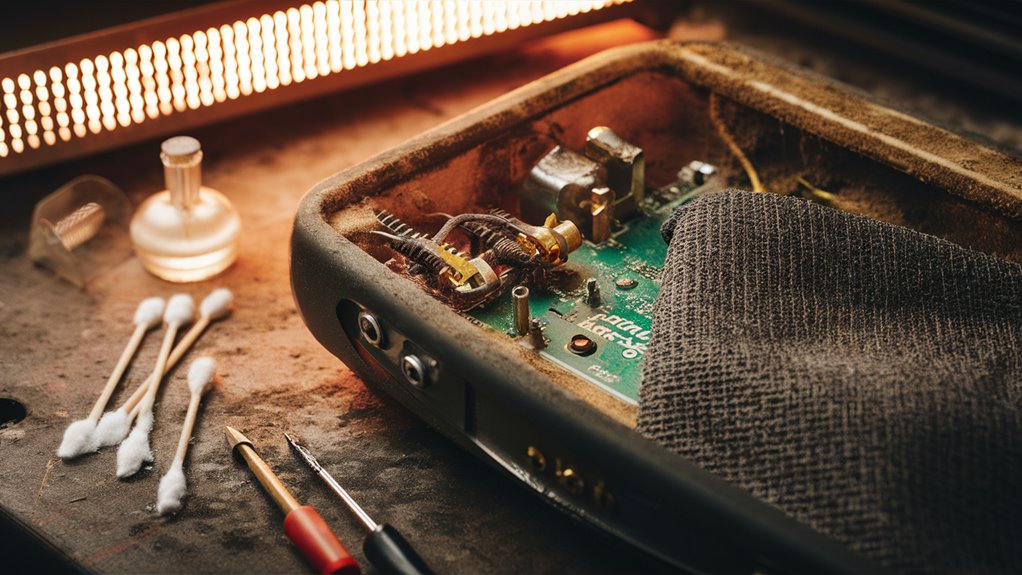
Professional Home Karaoke System [Expert Equipment Configuration]
Essential Components That Deliver Professional Sound Quality
- A mixer console of professional quality that can produce a balanced audio control center
- Microphones that are of professional-grade and have feedback suppression built into the system for protection
- Powered speakers or an amplifier system. A pair of studio monitors, for example, is mounted on the wall alongside a small mixer board with all signal connectors
- Digital audio interface for seamless connectivity. Once you turn on your computer or laptop, a pop-up screen will appear asking what type of digital audio driving device you want to use for playback
- Reliable software or media player to perform your karaoke songs
Setting Up Your Audio System for Maximum Performance

To achieve sound as good as a professional studio:
- The method you choose for setup or installation will be of critical importance in obtaining your desired result
- Proper acoustic treatment improves a room’s overall sound character and makes room acoustics much less of a problem
- Microphone calibration and digital signal processing may be required to enhance the original sound
- Wireless microphone systems ensure uninterrupted performance even in case of power failures
- Accurate calibration allows for high-quality recording in a professional sound environment
Introduction to Karaoke Business
Basic Karaoke Machines
- Some karaoke machines use CDs instead of tapes, and laser discs replace records
Core Professional Karaoke Components Guide
- Professional mixer console design for balanced sound
- High-quality professional-grade microphones with built-in feedback suppression
- Professional karaoke sets provide powerful sound quality
- Investing in top-of-the-line equipment ensures an error-free performance
- Serious music lovers prioritize high-quality audio gear
- Software requirements for professional playback and recording are crucial
Gear Specifications
- A professional setup requires extensive system configuration
- Monitoring at the mixing end includes VCA (voltage-controlled amplifier) for precise control
- Digital reverb and special effects enhance performance convenience
Sound Reinforcement And Display Systems
- Key components for broadcasting concert sound include full-range PA speakers
- A separate performer monitoring system ensures accurate pitch and placement
- High-definition monitors display lyrics clearly
- Feedback elimination technology is essential for clear sound
System Integration And Protection
- High-quality XLR microphone cables, speaker cables, and various audio connectors are necessary
- Rack-mounting systems ensure safe storage and ventilation for equipment
- This unified approach maximizes system reliability and lifespan https://getwakefield.com/
Microphone Selection And Sound Quality
Microphones for Karaoke Systems
Requirements for Professional Microphones
- The dynamic microphone is the cornerstone of superior karaoke sound
- For solo or duet performances, at least a pair of professional microphones ensures top-quality sound
- Compact microphone caps help manage voice levels without feedback or ambient noise disturbance
Key Technical Specifications
- High-end karaoke microphones feature a cardioid pickup pattern for vocal isolation and reduced background noise
- Leading brands such as SHURE SM58 and SENNHEISER e835 provide superior audio clarity and durability
Sound Optimization Techniques
- Proper gain staging and equalization settings prevent distortion and optimize signal strength
- Adjusting the 3-4 kHz mid-range frequency enhances vocal clarity
- Reducing bass frequencies (below 80 Hz) minimizes muddiness
Amplifiers and Speaker Systems
Power Amplification Considerations
- Power amplification is crucial for optimal sound reproduction
- Professional amplifiers must meet home audio needs
- Recommended amplification: 300-500 watts per channel for distortion-free performance
Configuration Requirements For Speakers
A 3-way speaker system includes:
- 12-inch woofer
- Mid-range driver
- Optimize Your Karaoke
- Tweeter for high frequencies
- Proper speaker stands ensure even sound distribution
Advanced System Integration
- The crossover network plays a crucial role in sound division
- If main speakers connect to a subwoofer via an 80-100 Hz crossover point, it:
- Reduces strain on the main speaker
- Enhances bass response
- Improves audio power and clarity
Software and Song Management
Software Needs
- Professional karaoke systems require high-reliability software
- Essential features include:
- Support for multiple file formats (MP3+G, CDG, ZIP)
- Reliable and fast search functionality
- Smooth lyric scrolling
- Key change modules for tone adjustments
- Playlist creation and storage options
Advanced Music Management
Music Library Management
- Organizing large song databases includes adding metadata such as:
- Title
- Author
- Performer
- Genre
- Language
Professional Software Selections
Top karaoke software choices include:
- DJ Virtual Pro
- DEX 3
- PCDJ Karaoki
These platforms offer dual-screen display, crowd request features, and rotation list management.
Data Security and Compliance with Legal Standards
- Backup strategies include:
- External hard drives
- Cloud storage services
- Regular backups
- Ensure legal compliance by using:
- Licensed karaoke music
- Authorized purchases
- Regular software updates
Venues
Your Professional Karaoke Venue
Stage and Sound Layout
- A performance area of at least 6×8 feet ensures visibility from all angles
- Main speakers should be set at ear level with a 15-degree inward angle for optimal sound distribution
- Position the subwoofer against a wall to improve bass response and minimize phase cancellation
Acoustics and Audio Systems
- Acoustic treatments like absorbent panels control reverb and minimize echoes
- Thoughtful speaker placement reduces feedback
- Floor treatments like commercial-grade carpet prevent sound reflections
Technical Setup and Equipment Positioning
- Mixers should be visible and accessible for easy adjustments
- LED par cans and lighting systems create a professional ambiance
- Dimmer switches allow for quick mood changes
- Seating should provide unobstructed views and clear pathways
- Strategically placed song catalog stands improve organization and user experience
Venue Optimization Techniques
- Install quiet walls and ceilings to enhance acoustics
- Use professional wireless microphones for flexibility
- Implement a digital song database with a simple management interface
- Arrange seating strategically for an engaging environment
- Ensure emergency lighting systems comply with safety regulations



